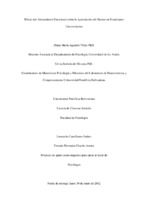Efecto del alertamiento emocional sobre la apreciación del humor en estudiantes universitarios
Fecha
2014-09-10Director/Asesor
Agudelo Vélez, Diana María
Tipo de contenido
bacherlorThesis
Citación
Metadatos
Mostrar el registro completo del ítemDocumentos PDF
Resumen
Los estudios que relacionan la apreciación del humor y el alertamiento emocional, generalmente han proporcionado resultados inconsistentes y contradictorios, sugiriendo que el alertamiento afectaría la apreciación, pero dejando aún el interrogante acerca de cuál sería su efecto. Este estudio determinó el efecto del alertamiento emocional sobre la apreciación del humor en universitarios, planteando que la apreciación disminuiría en el grupo experimental, pero no en el grupo control, después de la exposición a la Prueba Auditivo-Visual. Se seleccionaron 100 adolescentes, asignados aleatoriamente a dos grupos, uno experimental y otro control. Respondieron a la MINI Entrevista Neuropsiquiátrica Internacional, la Positive and Negative Affect Schedule, el State-Trait Cheerfulness Inventory, las Formas A y B de la Escala de Apreciación del Humor, y de acuerdo al grupo de asignación, presenciaron una historia auditivo-visual diferente. Los resultados muestran reducción en la apreciación del humor posterior a la presentación de la historia, sin embargo, la apreciación también disminuyó en el grupo control, y no difirió significativamente en la comparación inter-grupos, rechazándose la hipótesis. Así pues, se indica que la reducción no se asoció al alertamiento generado por la historia, lo que podría deberse a la repetición de la tarea en la Forma B y el cambio que ello implica en las expectativas acerca de la prueba, o a los ítems diferentes en las Formas A y B. Los adolescentes se caracterizaron por mayor afecto positivo y alegría, rasgos que correlacionaron y predijeron débilmente la apreciación de algunos tipos de humor, lo cual fue un resultado inesperado, considerando los antecedentes teóricos; quizá, clasificar los grupos por rasgos en la fase inicial de investigación, facilitaría interpretaciones más claras. Finalmente, utilizar en futuros estudios otra clase de alertamiento o distintos formatos humorísticos, al igual que un instrumento que no alerte al grupo control, podría generar resultados diferentes. Studies that relate the appreciation of humor and emotional arousal have generally provided inconsistent and conflicting results, suggesting that the arousal would affect the appreciation, but still leaving the question about what would be its effect. This study determined the effect of emotional arousal on the appreciation of humor in college, proposing that the appreciation would decrease in the experimental group but not in the control group after exposure to Prueba Auditivo-Visual. Were selected 100 adolescents, randomly assigned to two groups, one experimental and one control. Responded to the MINI International Neuropsychiatric Interview, the Positive and Negative Affect Schedule, the State-Trait Cheerfulness Inventory, Forms A and B of Escala de Apreciación del Humor, and according to assignment group, were present at a different auditory-visual story. The results show a reduction in the appreciation of humor after the presentation of story, however, the appreciation also decreased in the control group and did not differed significantly in inter-groups comparison, rejecting the hypothesis. Thus, it indicates that the reduction was not associated with alerts generated by the story, which could be due to the repetition of the task in the Form B and the change it implies in the expectations about the test, or different items in Forms A and B. The adolescents were characterized by more positive affect and cheerfulness, traits weakly correlated and predicted the appreciation of some types of humor, which was an unexpected result, considering the theoretical antecedents; perhaps, classify the groups according their traits in the initial phase of research would facilitate clearer interpretations. Finally, future studies using other kind of arousal or different humorous formats, or an instrument that does not alert the control group, could produce different results.
Palabra/s clave
Psicología
Estudiantes universitarios
Adoelscentes
Emociones
Tesis y disertaciones académicas
Colecciones
- Trabajos de grado [6440]


